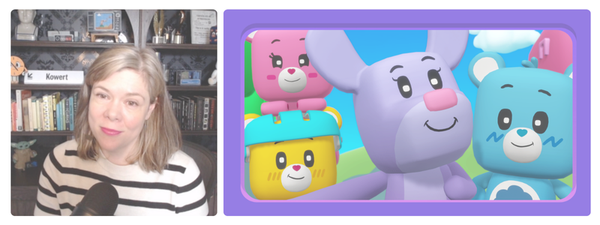With Thanksgiving around the corner, digital parents raising kids in a fast-paced modern world can take some time to reflect on what we’re thankful for. Expressing gratitude as the holiday season begins helps ground us in the abundance that surrounds us.
Today, I want to discuss how grateful I feel (and maybe you do too?) for the endless forms of digital play I can offer my children. We might spend too much time battling over them that we forget to recognize the gratitude we should have for them. After all, they’re incredible learning tools and spaces for connection.
Video games give kids opportunities to teach so many valuable life skills, from creativity and communication to empathy and financial literacy. They also afford the opportunity to learn, model, and practice gratitude.
Whether we use these games as a tool for entertainment, stress relief, learning, or connection, I am grateful that we get to have them so easily. And, that we can share them so easily with our kids.
Nurture is a kids’ app that develops Life Readiness skills such as creativity, curiosity, and critical thinking. All the more important in the age of AI, they're developed through fun, interactive, story-driven adventures. Nurture Academy — that’s where you are right now! — is for parents learning what it takes to raise smart, happy, and resilient kids in our increasingly digital world. We’re glad you’re here!
Read on, then discover how Nurture works or get the app.
What is Gratitude in the Realm of Kids’ Life Skills?
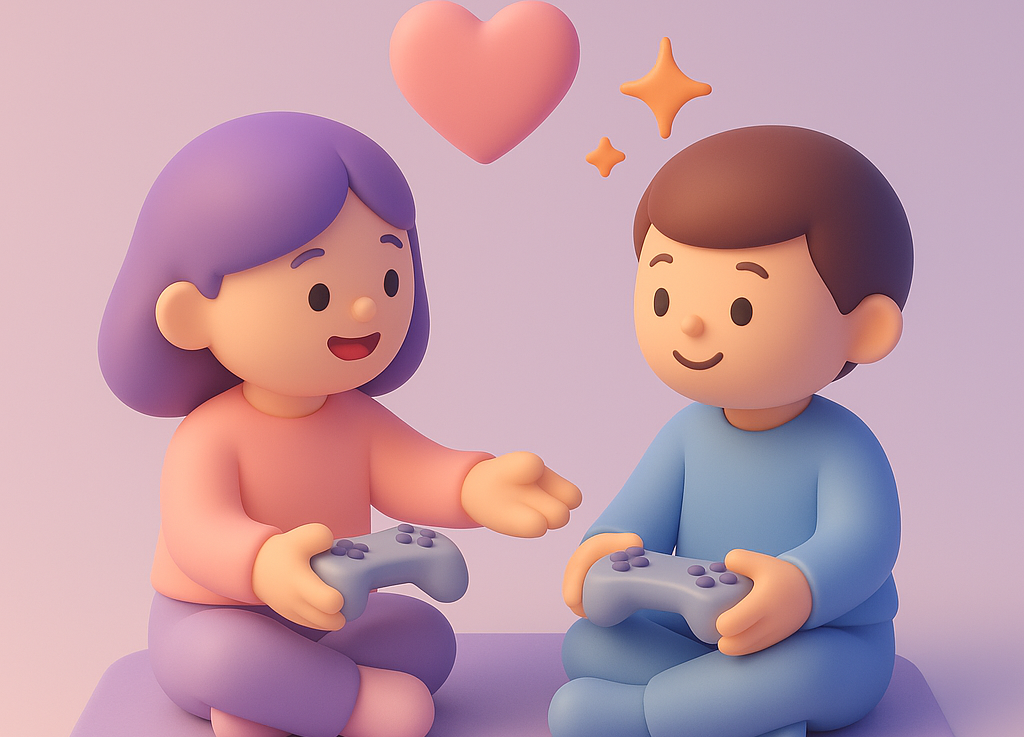
Gratitude is the quality of being thankful. It’s the readiness to show appreciation and return kindness. That kindness element connects directly to empathy, which ties into how we can notice, appreciate, and express thanks for and to those around us.
For kids, gratitude is best explained in those terms: stopping to understand and recognize when something good has been done for them, then sharing that appreciation.
Both verbally and nonverbally, kids can show and exemplify gratitude on their own or when prompted to reflect. Simple expressions of gratitude, like teaching kids to say “thank you”, are the foundation of a grateful mindset.
Video Games and Gratitude
Academic studies have proven that games can effectively teach gratitude. In Teaching Gratitude Through Digital Play, researchers developed a purpose-built mobile game for preteen kids. The game was not only successful in entertaining and engaging the students, but also in imparting the meaning and values of gratitude. It helped them grasp different ways to express gratitude through in-game moments and offline reflection exercises.
Research from communication scholar Mary Beth Oliver distinguishes between “fun” games that engage and challenge us, and “meaningful” games that make us feel connected, inspired, or reflective. These meaningful experiences often involve the same emotions that gratitude depends on (such as appreciation, empathy, and perspective-taking), reminding us that video games can be more than entertainment.
They can also be experiences that move us to feel thankful. Meaningful games fulfill emotional needs like connection and reflection, the same emotions that gratitude depends on.
Here are a few other ways we can think about gratitude around gameplay and co-play.
Thankful for Access
Just being able to consider video games is a reason to be grateful. Not everyone in the world has access to the internet or a tablet. It’s not about guilt, but recognizing how lucky we are to have these tools. Being able to curate and offer safe spaces, like a living room with a watchful parent nearby, is a reason to be thankful.
Thankful for Co-Players
We can also help kids appreciate their co-players. Friends, siblings, parents, and others who share that time, focus, and emotion with them are a reason to be grateful. A simple, “Thanks for playing with me,” or a compliment on their skill or progress — “You found the treasure!” or “Nice jump there!” — integrate gratitude and kindness into the experience. Digital play is full of these moments and opportunities.
Thankful for Creators and Characters
The fact that any game gets made is a bit of magic. Even small indie games can involve hundreds of professionals, including developers, creatives, writers, and others with artistic and technical abilities.
A great example of community gratitude is the hype around Balatro, the poker-esque card game app. So many who love the game (and there are a lot, myself included) bring up that it was developed singlehandedly. They direct their praise at the developer who created it, yet that doesn’t spread credit where credit is due. As this on-point LinkedIn post explains, the marketing and other professional teams that supported Balatro have as much to do with its success and availability as the developer does.
Even when indie game companies and professional game-builders face industry and economic headwinds, these people devote their time to bringing joy and entertainment to the world.
Thankful for Learning Moments
Games give us the chance to try and fail safely, and that’s definitely something to be grateful for. You might die on the first Goomba in Mario over and over, but you get to keep trying again and again, as many times as you need to. That’s the gift of gaming.

We can be thankful for these endless opportunities to keep learning, keep trying, and practice resilience in the face of failure.
Thankful for Opportunities to Give Back
How do we give back through gaming? By teaching our younger siblings, of course!
Co-playing with other kids, creating something together, is a great way for kids to give their time and wisdom to others. My kids share a Minecraft room, so they can build together, and they constantly compliment one another’s creations. Gratitude, generosity, empathy — that’s all baked into the experience.
Or, in Animal Crossing, the kids can bring fruit from their towns to each other’s islands. They learn generosity through digital acts like that.
5 (More) Reasons I’m Grateful for Digital Play as a Parent
Before I get into discussing specific games that are great for teaching gratitude, I want to share a few more reasons I’m thankful to be raising kids in this day and age, when we have digital play as a valuable, flexible, immersive tool for fun, growth, learning, and development.
- I love that I get to co-play with my kids and that we have so many options. They might love a game one day, not so much the next, but there is always something else we can play together.
- I’m thankful for the opportunities it gives us to try, fail, laugh, and even get beaten by our kids. Those growth and bonding moments are priceless.
- Digital play gives my kids a way to relieve their stress at the end of the day in a safe, accessible manner.
- Video games grow with our kids, whether they play their favorite games in a new way or find new favorites.
- I’m grateful for the ways video games can teach life skills like emotional regulation, communication, empathy, and even financial literacy and other essential concepts.
Video Games with Built-in Themes of Gratitude
Some games are literally built with the primary purpose of teaching things like gratitude, compassion, and empathy. For adults, consider a game like Kind Words, where players write nice letters to send out into the digital world. They can also receive and respond to the letters of others — the only rule is that they keep it, well, kind. Many players reported finding it connective, restorative, and even life-changing.
One college professor even assigned her students to play the game, both to teach about the power and purpose video games can manifest, and to help the post-pandemic students work through their own feelings of isolation and disconnection.
The gaming blog, Love Thy Nerd, has also posted a list of gratitude-themed games for grown-ups. They also call out Stardew Valley, Journey, The Legend of Zelda: Breath of the Wild, and Flower, which combines an appreciation for nature. Another one — That Dragon, Cancer — takes players on a deeply emotional journey of childhood cancer, inspiring gratitude for life itself.
Journey takes a very unique approach. You play alongside someone you can’t communicate with, so you have to find other ways to show gratitude and cooperation.
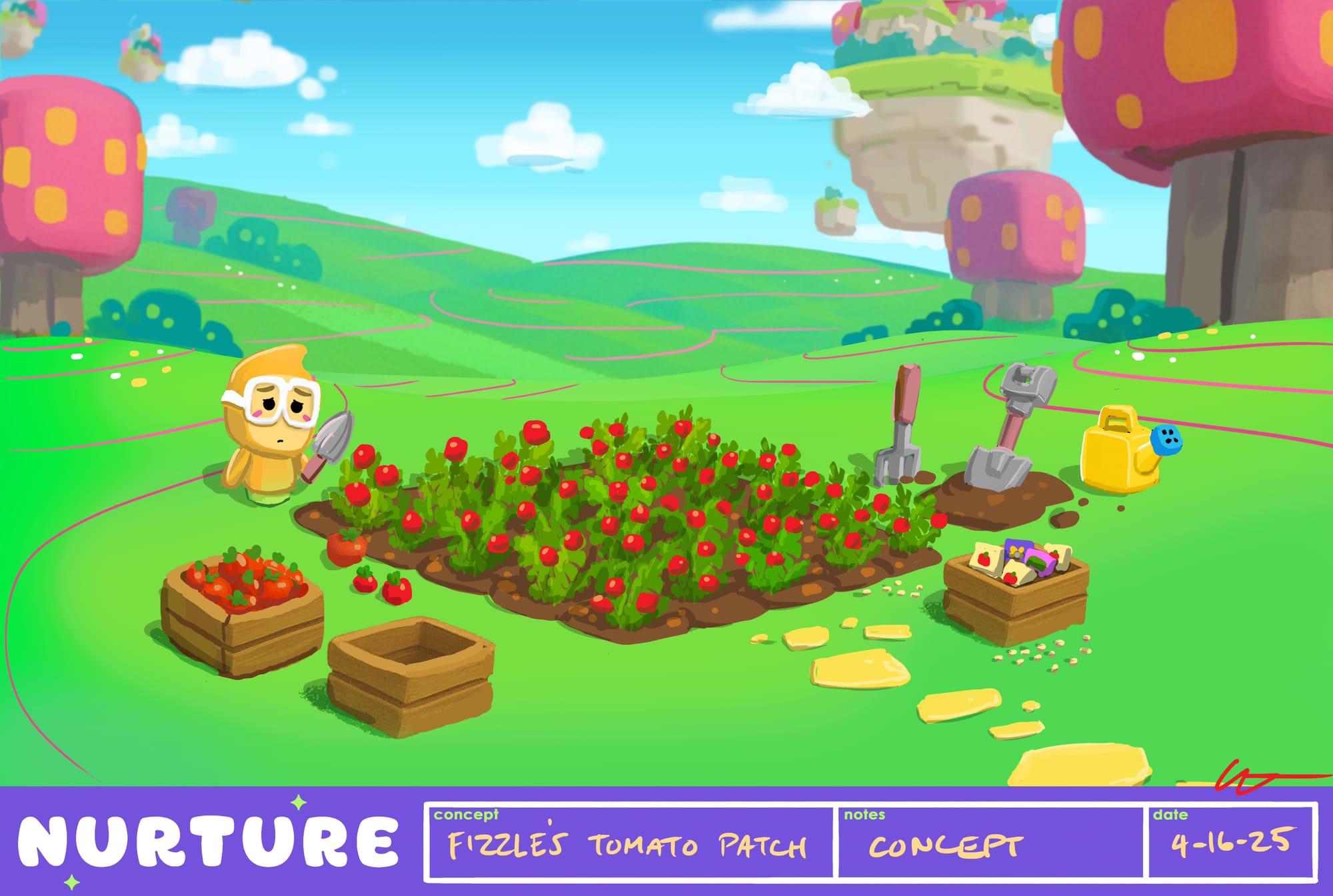
So, what about games for kids that inspire gratitude? Of course, Nurture is on the list. Through a variety of adventures, it sparks and embodies kindness and gratitude toward others, as well as toward the kid-players for the progress they’ve made.
Animal Crossing is another kid-friendly game with recurring themes of gratitude and community appreciation. My family also loves couch co-op games like It Takes Two and Death Squared. They’re perfect for gratitude and teamwork. We also like Overcooked — even though it tends to stress me out! Another moment to model emotional regulation, though, and I’m thankful for that.
In all of the example games above, we have not only in-game opportunities, but face-to-face moments to model and express gratitude. During family game nights, I find myself modeling gratitude by saying, “Thanks for showing me how to do that,” or, “Thanks for taking the time to play with me.”
Ways to Model and Practice Gratitude During Digital Play
How do we turn this games-for-gratitude theory into action? Here are a few tips.
- Model it out loud: One of my favorite things to say is, “Thanks for being patient while I learn how to move in three dimensions!” Even something as simple as, “I’m thankful we get to play this together,” makes the point.
- Use in-game systems: Many digital games have built-in appreciation methods, like giving points to teammates who did well, baking the gratitude right in.
- Pause for perspective: Bring up something like, “We’re lucky to have a few minutes before dinner — why don’t we play a game together?”
- Reflect and share: Ask, but also give your own answers to prompts like, “What was fun? What was the best part? Who helped make the game a good experience?”
The gratitude often comes easily when we simply say it out loud. Voicing our thoughts, we often realize how thankful we really are.
Bringing It Back to Real Life: Gratitude Beyond the Game
Gratitude practiced through play doesn’t stay on the screen — it spills into real life. When kids thank a co-player, share resources, or celebrate someone else’s win, they’re strengthening the same emotional muscles they’ll use offline: empathy, patience, and generosity.
Online and offline aren’t separate worlds. The lessons kids learn — even unintentionally — in digital spaces show up in how they talk to siblings, classmates, and even parents. Games like Animal Crossing and Minecraft encourage cooperation and sharing, while a simple “good game” and a handshake after losing builds perspective-taking and respect.
As parents, we can help kids notice those moments and bring them into daily life, by saying thanks out loud, reflecting on what they enjoyed most, or writing short thank-you notes together. Gratitude is a muscle, and digital play gives us plenty of chances to help it grow stronger, one small act of appreciation at a time.
Thanks for Playing (and Learning)
Gratitude isn’t about grand gestures, but the small, mindful moments of appreciation. Games give families a fresh way to notice and celebrate those moments together, whether it’s cheering each other on, saying thanks for a shared laugh, or simply enjoying time spent side by side.
So this Thanksgiving, fire up the Xbox after dinner. Wii Bowling is still fire — it’ll never go out of style — and Mario Party is always a hit for teaching both thankfulness and frustration in equal measure, in board-game style.
These playful moments remind us that gratitude grows not from perfection, but from connection.


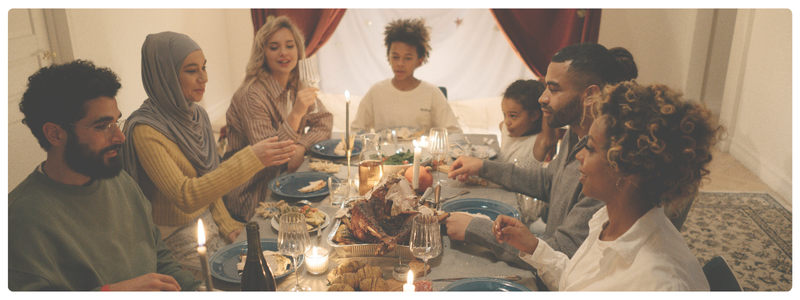


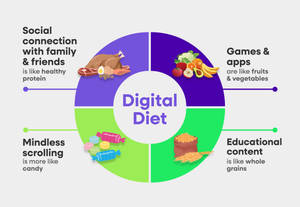
 Copy Link
Copy Link
 Share
to X
Share
to X
 Share
to Facebook
Share
to Facebook
 Share
to LinkedIn
Share
to LinkedIn
 Share
on Email
Share
on Email


